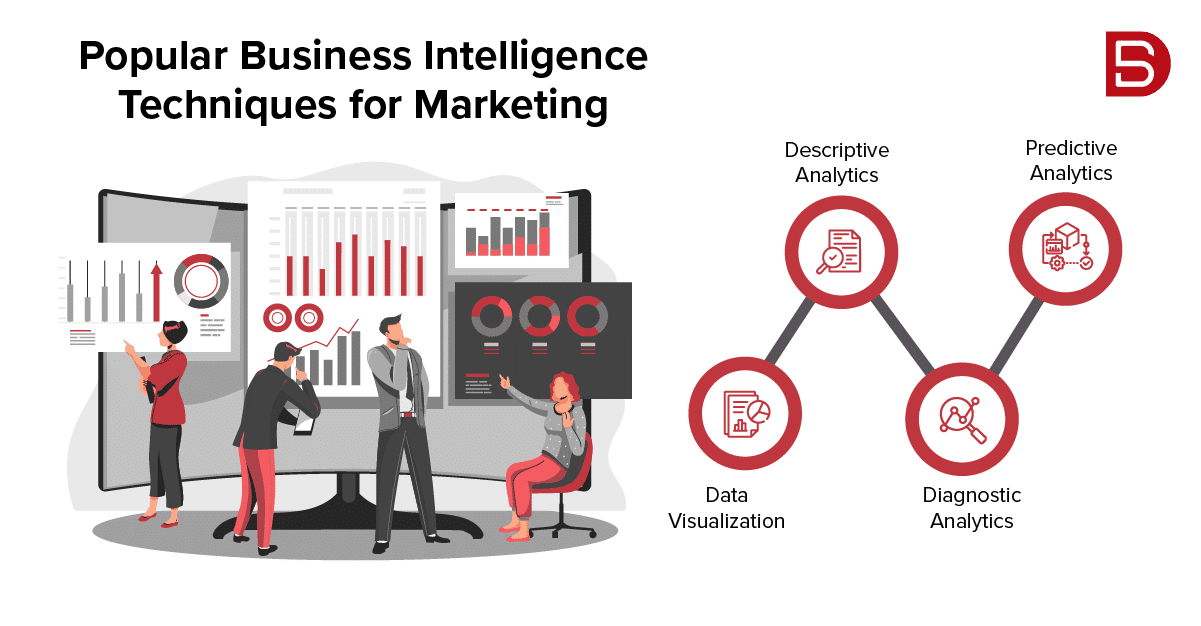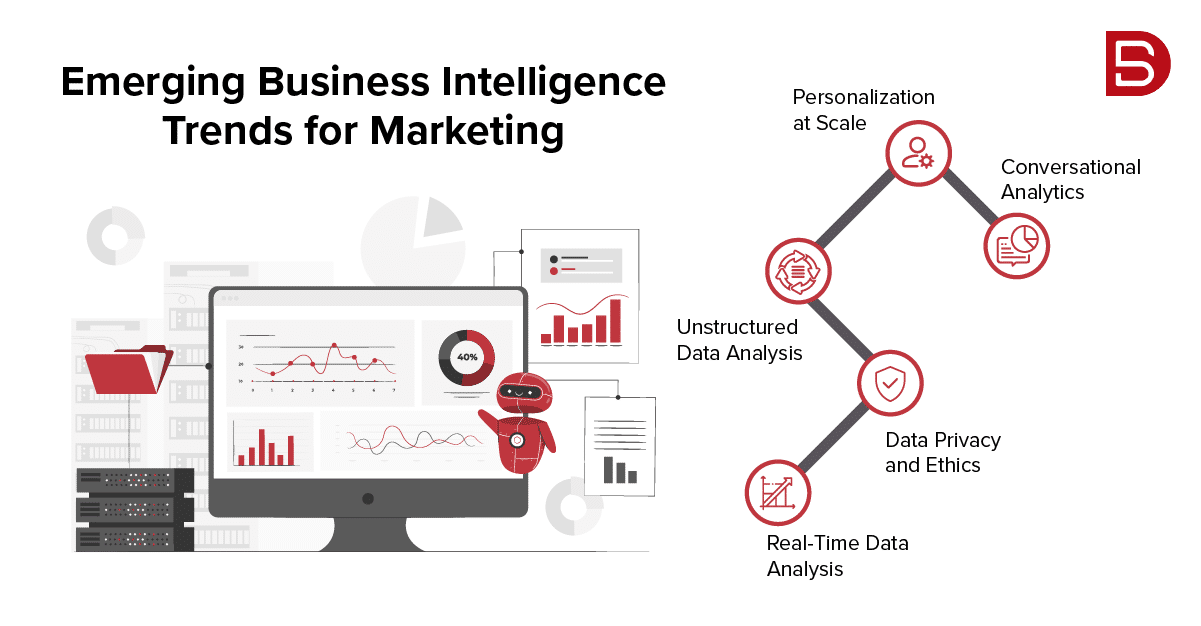Understanding the Role of Business Intelligence for Modern Marketing
In the modern transformative business landscape, businesses are besieged with overwhelming data daily. The periodic rise in data has made it imperative for businesses to look for tools, techniques, and trends to make sense of this overflow of information. The need for business intelligence for marketing is higher than ever as businesses look to integrate strategic data-driven decision-making into their business processes and foster competitive advantage. Enter business intelligence (BI) – a highly versatile world quickly becoming a linchpin for modern marketing strategies.
At its epicenter, business intelligence for marketing is a bouquet of tools, technologies, and processes that can be leveraged for gathering, analyzing, and transforming raw data into business insights. In B2B marketing, BI is a guiding light for modern marketers as they traverse the intricacies of marketing trends, volatile customer behavior, and campaign performances. By unleashing the true power of business intelligence for marketing, modern marketers can unearth many business opportunities buried under the heaps of data they sit on.
Predominantly, business intelligence for marketing is used to give a bird’s-eye view of the customer journey to the marketeer. Using data and analysis, BI allows the marketeers to capitalize on every interaction the customer has with their brand throughout their journey, from the first touchpoint to conversion and even beyond. This detailed understanding of the customer allows the marketeer to resonate deeply with the customer and create content, offers, and solutions that meet the customer’s requirements.
As we dive deep into this blog on “Business Intelligence for Marketing,” we will look at some of the most popular tools, techniques, and trends to help modern marketers extract insights from data to improve customer experiences and carve strategies for modern marketing. From collecting data to integrating it into business decision-making, we will look at how modern marketers are using BI to transform the traditional B2B landscape as we know it.
In the era of data-driven decision-making, business intelligence (BI) tools have emerged as essential companions for marketers seeking to extract actionable insights from vast amounts of information. These tools empower marketing professionals to transform raw data into strategic intelligence, guide campaigns, optimize resources, and deliver exceptional customer experiences. Let’s explore some of the critical business intelligence tools that are revolutionizing modern marketing:
Business Intelligence Tools for Marketing
For the modern B2B marketeer, business intelligence (BI) tools are their essential companions, for they empower them to make data-driven decisions by processing vast information in near real-time scenarios. These tools help marketers transform raw data into strategic intelligence and deliver exceptional customer experiences. Let us give you some of the critical business intelligence tools that can help you revolutionize your marketing:
- Google Analytics: A cornerstone of web analytics since the start of time, Google Analytics is the best tool to gain a comprehensive view of your website performance. It lets you track your website performance by analyzing traffic sources, user behavior, conversion rates, and more. It gives you valuable insights to refine your marketing strategies.
- Tableau: Tableau is the most renowned data visualization tool out there. It allows you to build interactive dashboards and reports for simplifying complex data into easy-to-understand visuals. It helps marketers predict trends and make informed decisions.
- Power BI: Microsoft’s Power BI is a dynamic data visualization and analysis tool. It can be seamlessly integrated with other Microsoft products, making it a popular data visualization tool for enterprises already using Microsoft’s suite of tools.
- HubSpot: HubSpot also has a BI tool suite that tracks website interactions, email campaigns, and social media engagement. It lets you easily monitor your buyer journey and tweak their strategies accordingly.
While these BI tools are prominent among marketers, these are just some from the wide gamut of BI tools that can help marketers create informed marketing strategies. Some other that you can explore in addition to these include:
- Google Data Studio
- Adobe Analytics
- Mixpanel
- Kissmetrics
- Salesforce Einstein Analytics
- IBM Cognos Analytics
- Looker
- Domo
Popular Business Intelligence Techniques for Marketing
With the growth in customer-generated data, business intelligence (BI) techniques have become essential to modern marketing. These techniques allow marketers to achieve their business goals by optimizing their marketing strategies and making informed decisions by harnessing the power of data-driven insights.
Here we have listed down some of the most popular BI techniques that are commonly practiced in the realm of modern marketing:
• Data Visualization
Data visualization using graphs, charts, and dashboards makes it easier for marketers to break down complex insights into easy-to-understand visuals. This allows them to predict patterns, identify trends, and make strategic business decisions.
• Descriptive Analytics
Descriptive analytics is all about harnessing the power of historical data by summarizing it to gain actionable insights from past performance. Modern marketers use it to analyze market trends, customer behavior, or for their campaign performance.
• Diagnostic Analytics
Diagnostic analytics delves deep into the data to understand the causes behind specific outcomes, including the success or failure of any particular campaign. This helps them tweak or amend their marketing strategies to get better results.
• Predictive Analytics
Predictive analytics leverage historical data to establish future trends, anticipate customer behaviors, market opportunities, and identify opportunities for better resource allocation.
Furthermore, some more widely popular and effective business intelligence for marketing techniques include:
- Prescriptive Analytics
- Segmentation and Clustering
- A/B Testing
- Cohort Analysis
- Social Media Analytics
- Customer Lifetime Value (CLV) Analysis
- Text Mining and Sentiment Analysis
All these modern business intelligence techniques empower modern marketers to transform their data into insights for optimizing campaigns, improving customer experiences, and eventually driving business success.
Emerging Business Intelligence Trends for Marketing
Business intelligence is an ever-evolving space, putting marketing leaders at the forefront of harnessing the power of change to drive strategic business growth. Some of the popular BI trends that we see shaping the future of modern marketing include:
• Real-Time Data Analysis
With the immense growth in IoT (Internet of Things) combined with the quick rise in data generation and 5G, real-time data analysis becomes a reality with time. All that computational power will enable marketing to tweak and analyze customer behaviors, market trends, Etc., on the go and make changes in real time.
• Data Privacy and Ethics
As the nation’s world tightens its data privacy regulations, we will see the rise of ethical data usage with every passing day. We will also see the evolution of BI tools to comply with these data privacy and ethics regulations such as GDPR.
• Unstructured Data Analysis
Unstructured data has been a significant hindrance for BI tools; however, with the advent of LLMs (Large Language Models), BI tools are becoming adept at efficiently and meaningfully analyzing unstructured data from sources such as customer reviews, social media, and emails. This allows marketers to extract valuable insights from diverse data sources.
• Personalization at Scale
Personalization is the cornerstone of every successful marketing campaign today. By analyzing vast chunks of data, BI tools facilitate personalization for modern marketers. You can now use these tools to create, tailor, and quickly deliver content suited to different customers in your database.
• Conversational Analytics
Embracing these BI trends, modern marketers stay ahead of the competition by harnessing the power of advanced data management and analytics strategies. The power of BI tools can unlock a whole new world of customer insights, which can then help you in business growth and innovation.
Conclusion
The world of business intelligence for marketing is an ever-evolving landscape with constant innovation and development in how we interact with BI tools. As the technology grows, these tools will grow, too, giving us newer ways to interact with our customers and deduce insights from customer data. If you want to embrace the power of business intelligence for marketing, we can equip you with the tools and insights matching your business requirement and help you get started. Email us at marketing@datamaticsbpm.com, and we will have our marketing experts reach out to you with a solution to help you get started.
 Select an element to maximize. Press ESC to cancel.
Select an element to maximize. Press ESC to cancel.
Somnath Banerjee




